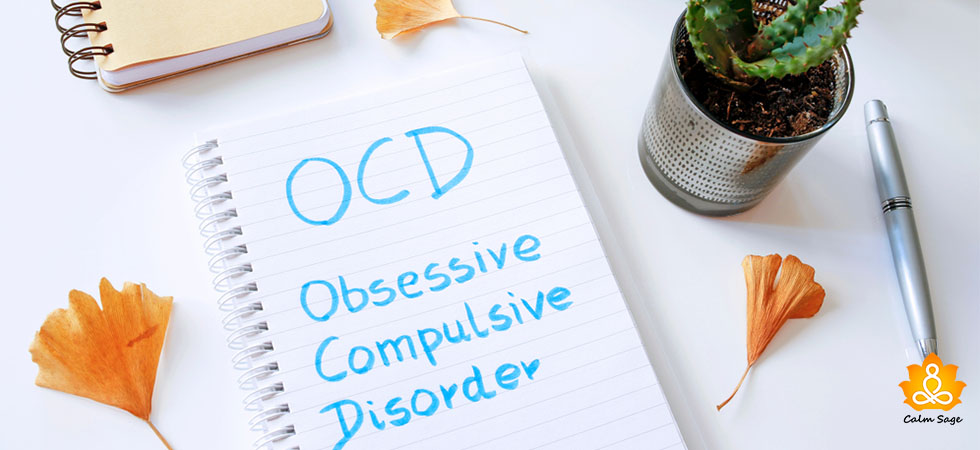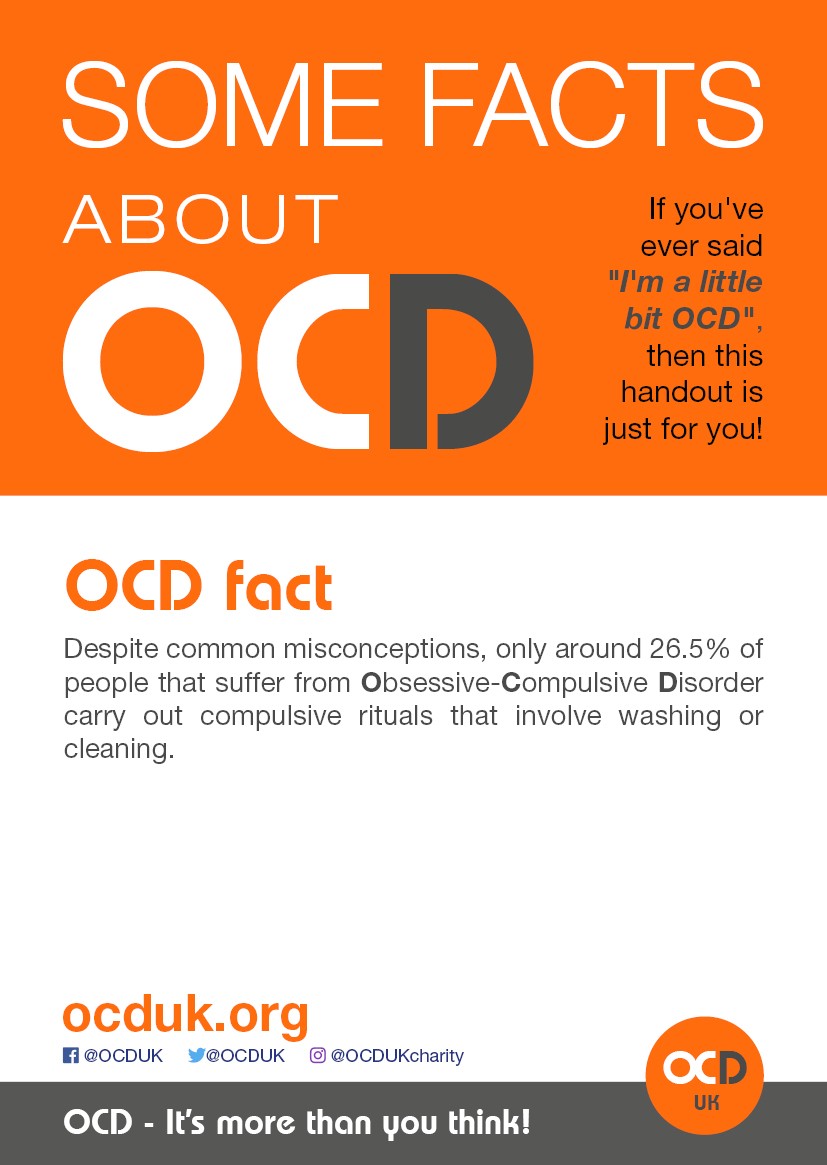Facts OCD is not simply an overreaction to the stresses of life. Knowing the facts about obsessive compulsive-disorder however helps you understand the condition and how its best treated.
1-5 OCD Facts.

10 facts about ocd. Individuals with OCD face serious regularly incapacitating uneasiness over quite a few things called fixations. ERP is the only therapy. OCD Can Affect Anyone.
Having OCD isnt just an eruption to the burdens of life. It can also start after something traumatic happening such as. Persistent OCD Symptoms Can Lead To Depression And Other Mood Disorders.
Top Ten Facts About OCD 1. OCD ranks tenth in the World Banks and WHOs ten leading causes of disability and in the case of women aged 1544 years OCD occupies the fifth position. OCD is an anxiety disorder characterized by symptoms that can include powerful unwanted or recurrent thoughts andor compulsive repetitive behaviors.
OCD can affect anyone at any age. The brain needs to have a certain balance in order to function properly. Facts about Obsessive-Compulsive Disorder.
For some OCD can start after having a baby for both men and women because of the responsibility to protect the child. Most short-term OCD incidents will end up resolving themselves over time with or without treatment or medication. One of many interesting facts about OCD is that it is everywhere in the world and affects people belonging to different economic class and standing.
OCD Stems from Anxiety Obsessive compulsive disorder is categorized as an anxiety disorder according to the National. While unpleasant circumstances can exacerbate the situation for individuals with OCD they dont cause OCD. Apart from these there are other symptoms.
Obsessive Compulsive Disorder is known in popular media as that problem that people who are really really picky and phobic about cleanliness have. Compulsions are repetitive behavioral or mental acts that are designed. Obsessions And Compulsions Are Two Different Things.
The disorder is characterized by obsessions repeated thoughts urges or. It starts 1 out of 3 incidents in the world today. Obsessive Compulsive Disorder Facts.
Obsessions are unwanted intrusive thoughts images or urges that generate high levels of anxiety. OCD only affects young people. OCD IS NOT THAT BIG A DEAL PEOPLE JUST NEED TO RELAX AND NOT WORRY SO MUCH.
Doubts about whether or not. OCD is a psychiatric illness recognized by experts throughout the world. As you might imagine having OCD.
People with obsessive-compulsive disorder OCD suffer intensely from recurrent unwanted thoughts obsessions or rituals compulsions which they feel they cannot control. If playback doesnt begin shortly. Research has shown that their brains are wired differently than the brains of people without OCD and as such OCD strongly influences their thoughts and actions.
Up to 60 of OCD cases dont display compulsive behavior and are affected primarily by obsessive thoughts that become disruptive to their lives. Up to 60 of suffers of OCD will have no overt compulsions. OCD incites uncontrollable fears and anxiety and while stressful situations can exacerbate symptoms in people with obsessive compulsive disorder.
OCD Can Cause Significant Anxiety. If you have obsessive thoughts and repetitive behaviors or rituals youre not alone. One of the common misconceptions about OCD is that obsessions and compulsions are the.
OCD Is Around the World. 10 Interesting Facts and Misconceptions About OCD 1. You dont have to display compulsive or ritualistic behavior eg.
Obsessions come in all shapes in sizes. The OCD facts below shed light on different aspects of this troubling mental health disorder. Excessive hand-washing to be diagnosed with obsessive-compulsive disorder.
More than 23 of Americans suffer from it at some point in their lives. Many People With OCD Have Insight Into Their Symptoms. OCD can impact the quality of life in many ways including the pursuit of education employment status financial independence ability to socialize and self esteem.
People With OCD Can Get Better At Controlling The Problem But There Is No Cure. Most of the time OCD starts when someone is younger but it can also start in adulthood. Stomach aches anxiety increase in heart beat breathing issues headaches giddiness etc are also seen.
This is the good news. OCD affects everyone differently even when certain symptoms are more common. No thought is too weird for OCD.
Obsessive-Compulsive Disorder Facts. So we pulled the Bobes article and checked the source of the above text which was the World Health Organizations The newly defined burden of mental problems. Obsessive Compulsive Disorder OCD is a mental anxiety disorder which produces repeated thoughts or images about many different things such as fear of germs dirt or intruders.
OCD is characterized by obsessions and compulsions. About one-third to one-half of all OCD sufferers had OCD in childhood whether it was recognized or not. People With OCD Know Their Symptoms.
Having OCD is not simply an overreaction to the stresses of life. Facts About Obsessive-Compulsive Disorder 1. If you have OCD you may experience severe anxiety as a result of obsessive.
If you have OCD you may recognize the irrationality or. Or being overly tidy. OCD Is Embarrassing for the Suffer.
Rituals such as handwashing counting checking or cleaning are often performed with the hope of preventing obsessive thoughts. 10 Facts About OCD Obsessive-Compulsive Disorder Fact 1. OCD can get better.
Where youre in the grip of the condition it can feel. OCD is Disruptive Like most anxiety disorders obsessive compulsive disorder causes significant impairment to the. OCD is More Common Than You.
This is often referred to as pure-O. Pure by Rose Cartwright 1. The person who has OCD generally has feelings of sadness guilt anger shame etc.
Outside of family inheritance stress is one of the most common triggers for OCD. Approximately 3 million Americans have obsessive-compulsive disorder OCD at any given time according to the American Academy of Family Physicians. Common obsessional thoughts include the fear of contamination and doubting whether you did something or did something correctly.
Most people with OCD have both obsessions and compulsions though its estimated that as many as 20 percent have obsessions only while 10 percent simply experience compulsions. Other Facts About OCD.

10 Interesting Facts About Obsessive Compulsive Disorder Ocd You Should Know

Ocd Awareness Week Fact Day Four Ocd Uk

Interesting Ocd Facts Scientific Obsessive Compulsive Disorder Facts
